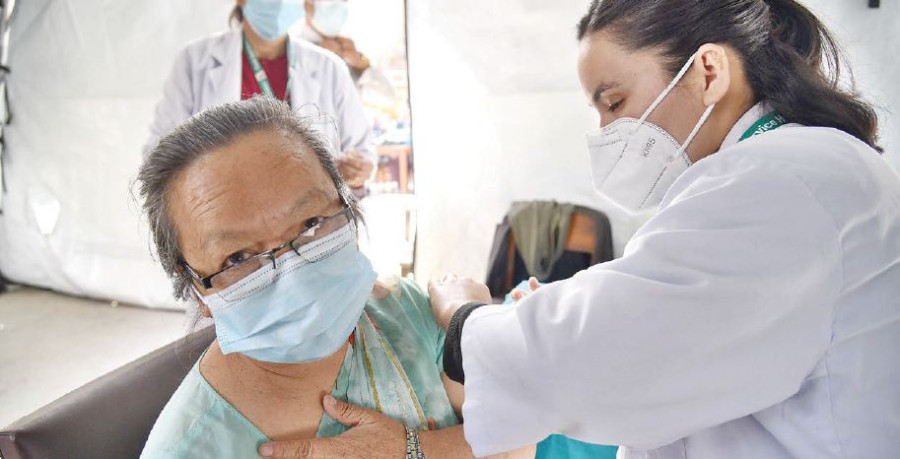Health
Health Ministry says ongoing Covid-19 vaccination will not stop
While several countries in Europe have reported side effects and suspended use of the AstraZeneca vaccine, no serious adverse effects have been seen in Nepal.
Arjun Poudel
At a time when several countries in Europe have suspended administering the Covid-19 vaccine developed by the University of Oxford and AstraZeneca, a British-Swedish multinational pharmaceutical company, Nepal says there is no reason to halt its ongoing immunisation drive.
Officials said no serious adverse effects have been recorded following the immunisation, in which Covishield, developed by the University of Oxford and AstraZeneca, is being used.
“As of today, we have not recorded any serious adverse effects after immunisation,” Dr Jhalak Sharma, chief of the Child Health Section at the Family Welfare Division under the Department of Health Services, told the Post. “Some people have complained of mild fever and weakness following the immunisation, which is normal.”
At least a dozen countries—Denmark, Norway, Iceland, Bulgaria, Italy, Romania, Bulgaria, Luxembourg, Estonia, Lithuania, Latvia and Austria—in Europe have either suspended or are mulling to suspend the University of Oxford and AstraZeneca’s vaccine following an unconfirmed number of cases of the vaccine recipients developing blood clots.
Thailand became the first Asian country to halt the use of vaccines over the safety concerns.
The Ministry of Health and Population said that altogether 1,446,182 people have been vaccinated with the first dose as of Friday. It is around 4.9 percent of the total 30 million Nepalis.
In the second round of the campaign that started on Sunday, which is targeted at immunising people above 65 years old, 1,007,303 have taken the jabs in six days, which is more than 65 percent of the estimated target. Authorities had earlier said that the second round of the campaign will continue for 10 days but this could be extended.
The Covishield vaccine manufactured by the Serum Institute of India has been taken by frontline workers, journalists, staff serving at diplomatic missions, people residing in old age homes and lawmakers, among others. Even Prime Minister KP Sharma Oli, who has undergone kidney transplant twice in the past, has taken the jab.
“Arranging sufficient doses of vaccine has become a challenge for us,” Dr Shyam Raj Upreti, coordinator of the Covid-19 vaccine advisory committee, told the Post. “We will not suspend the ongoing immunisation drive and inoculating eligible people at the earliest is the government’s priority.”
Even the World Health Organization on Friday said it was aware of blood clot concerns linked to “a specific batch” of AstraZeneca/Oxford Covid-19 vaccine but maintained that no one has died from any coronavirus vaccine.
According to Upreti, neither any serious adverse events have been recorded in Nepal, nor has the UN health agency recommended the vaccine’s suspension.
Nepal started its Covid-19 immunisation drive on January 27 with one million doses of Covishield provided by India in grant on January 21.
In the first phase of the campaign, frontline workers—health workers, sanitation workers, ambulance drivers, security personnel deployed for management of bodies of people who die due to complications related to coronavirus infections, prisoners and people residing in old age homes—were inoculated.
The second phase of the immunisation drive started from March 7 with the one million doses of vaccine procured from the Serum Institute of India. Around half a million doses were yet to be used from the consignment received from India under grant assistance. The COVAX facility has also delivered 348,000 doses.
Meanwhile, the Health Ministry said that it has supplied all stock doses to the provinces and districts.
“We do not have any doses at the central store,” said Sharma, chief of the Child Health
Section at the Family Welfare Division. Immunisation programmes have completed in some centres, and some are about to complete.
Sharma concedes that some centres have halted the immunisation drive in the lack of vaccines.
The Health Ministry claims that it has directed reverse supply (supply of the vaccine to immunisation centres that lack the jabs from those which have surplus doses).
Officials at the ministry are expecting one million doses to be delivered from the Serum Institute of India at the earliest, for which the government has already made an 80 percent advance payment.
Those million jabs will be used to administer the second dose, according to officials. The ministry had earlier planned to use all the doses for the first dose but due to the uncertainty over acquiring sufficient doses, people of other groups will not be immunised.
“We will immunise all as per the availability of vaccines,” Dr Samir Kumar Adhikari, joint spokesperson for the Health Ministry, told the Post. “We have to provide second doses to those who have already taken the first doses.”




 14.24°C Kathmandu
14.24°C Kathmandu















